Greek Stuffed Cabbage Rolls (Lahanodolmades) are a classic Greek dish perfect for any occasion. Tender cabbage leaves are filled with a mixture of minced beef, rice and herbs, then simmered in a flavourful broth and drizzled with a rich, lemony sauce.
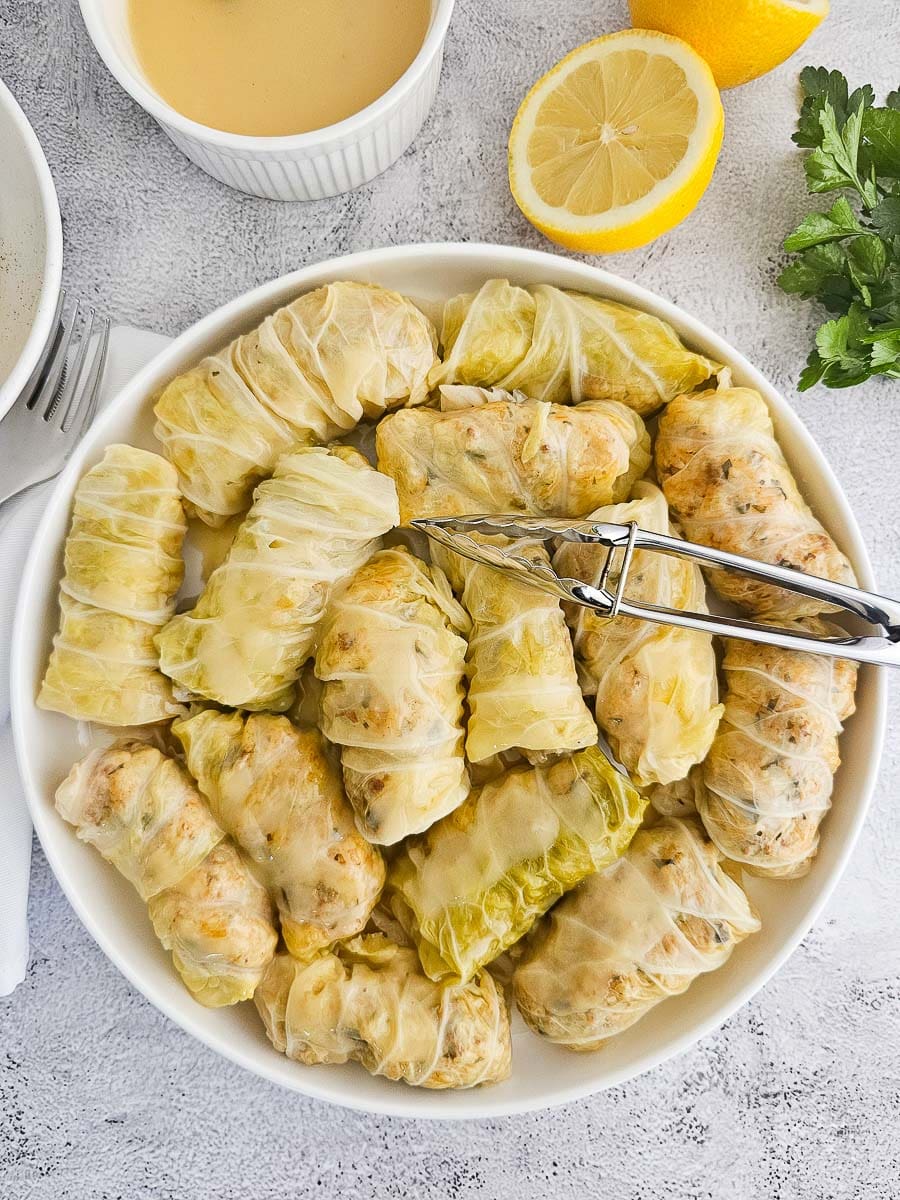
Growing up, my mum’s and aunt’s cabbage rolls were a standout favourite. Their recipe is simple but has a satisfying, homemade touch. They had the perfect mix of flavours, with just the right amount of herbs, allowing the flavours of the cabbage and filling to come through. One of the highlights of this dish was the lemon sauce they always served with it. It’s a must-try! Don’t skip it! It’s made similarly to béchamel sauce, but instead of using milk, the sauce is made with the cooking liquid left in the pot after the cabbage rolls have been braised. The sauce has a runnier consistency, which makes it perfect for pouring. Fresh lemon juice is added to create a rich, tangy flavour that pairs beautifully with the cabbage rolls.
To make the cabbage rolls, my mum starts by softening the cabbage leaves in a pot of simmering water and gently pulling them off one by one as they detach from the core. She uses savoy cabbage for its softer texture and finds it easier to roll, but plain cabbage works as well. For the filling, my mum cooks the mixture slightly before filling the cabbage leaves. This involves sautéing the onions and mince briefly before stirring in the tomato paste, rice, parsley and mint.
There is a bit of preparation involved, but the great thing about this recipe is that you can prepare the cabbage rolls in advance and then refrigerate them until you are ready to cook them.
Ingredients for Greek Stuffed Cabbage Rolls (Lahanodolmades)
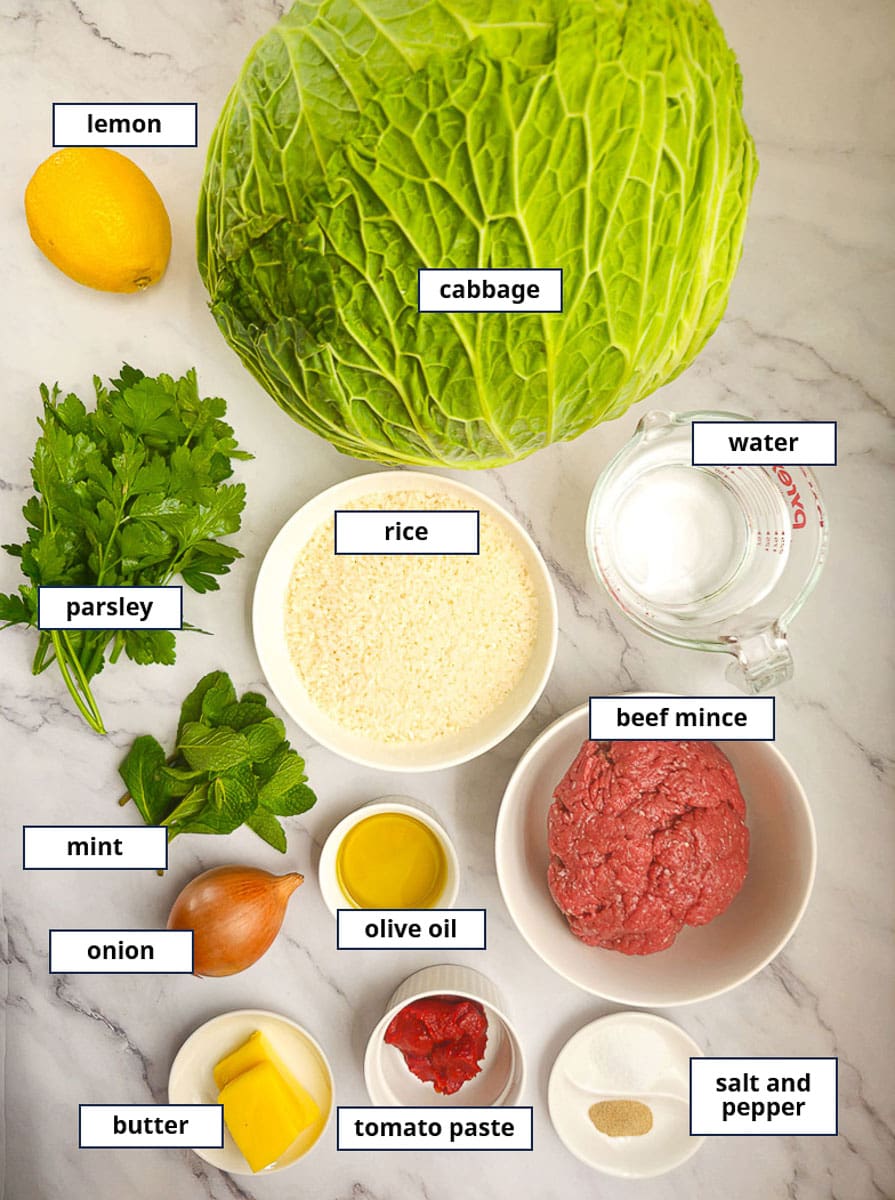
- Cabbage: I use savoy cabbage as it is softer and I find it easier to roll, but you can use plain cabbage (also known as green or white cabbage). You will need a large cabbage weighing around 2kg for this recipe. Any extra leaves can be used to line to base of your pot, or placed on top of the cabbage rolls while they cook. The cabbage leaves are quite flavourful when cooked.
- Minced / ground beef: I use lean, minced beef. You could use any type of mince, pork, lamb, or a combination. All work well.
- Water: Used to cover the cabbage rolls. You can also add a chicken stock cube for extra flavour, but my mum always uses just water.
- Rice: I use medium grain rice.
- Herbs: I use a combination of flat leaf parsley and a hint of mint.
- Lemon juice: Use fresh lemon juice, not bottled lemon juice.
Ingredients for the Lemon Sauce
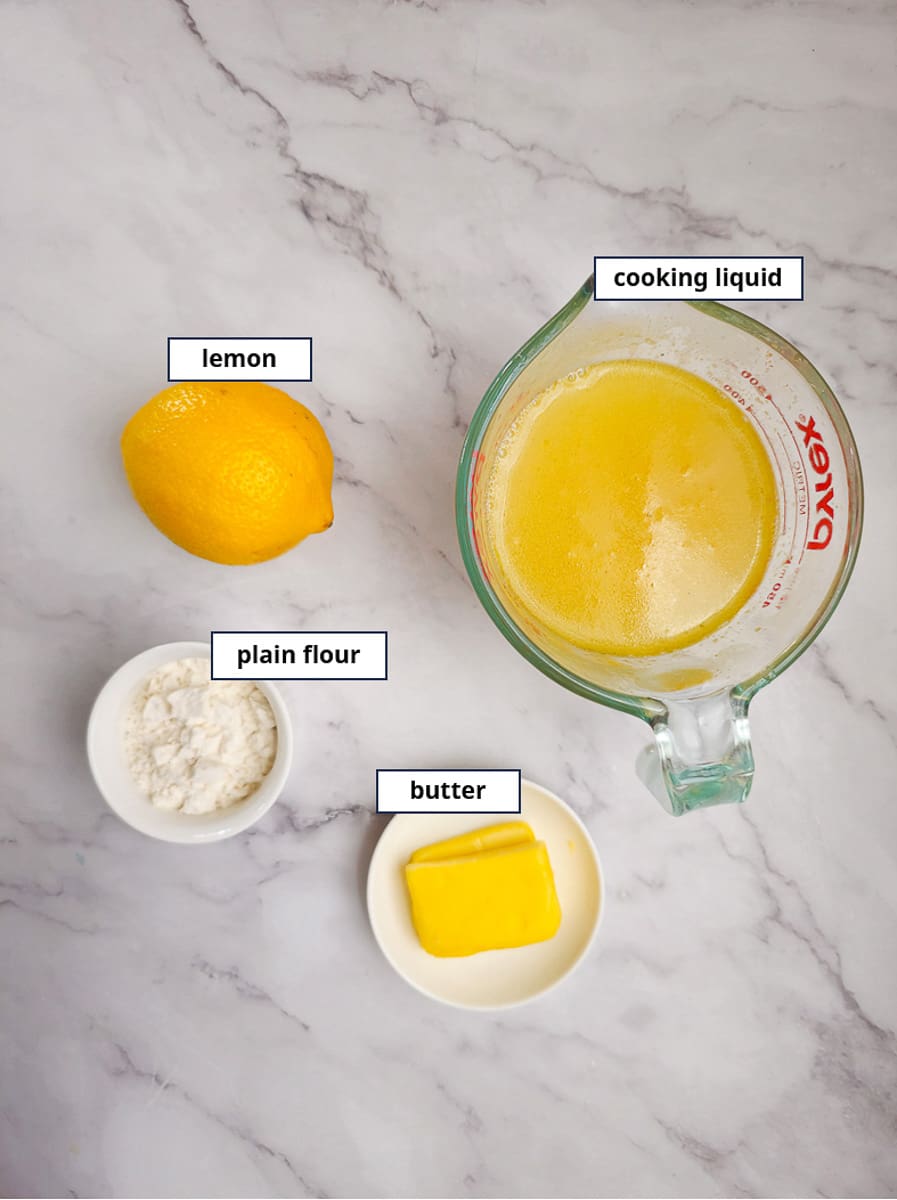
- Butter: I use salted butter. You can substitute with dairy-free if you prefer.
- Plain flour: Helps to thicken the sauce, giving the sauce a nice pouring consistency. If you’re gluten-sensitive or following a gluten-free diet, you can use gluten-free flour instead.
- Cooking liquid: This is the remaining liquid that is left in the pot after the cabbage rolls have cooked. It is full of flavour. Combined with lemon juice, it gives the sauce its unique taste. To reserve the cooking liquid, carefully remove the cabbage rolls from the pot first, then set aside the remaining broth to make the sauce.
- Lemon juice: Use fresh lemon juice. I like to use just enough to give a rich lemony taste. Use as much or as little as you like.
How to make Greek Stuffed Cabbage Rolls (Lahanodolmades) with Lemon Sauce
Prepare the cabbage
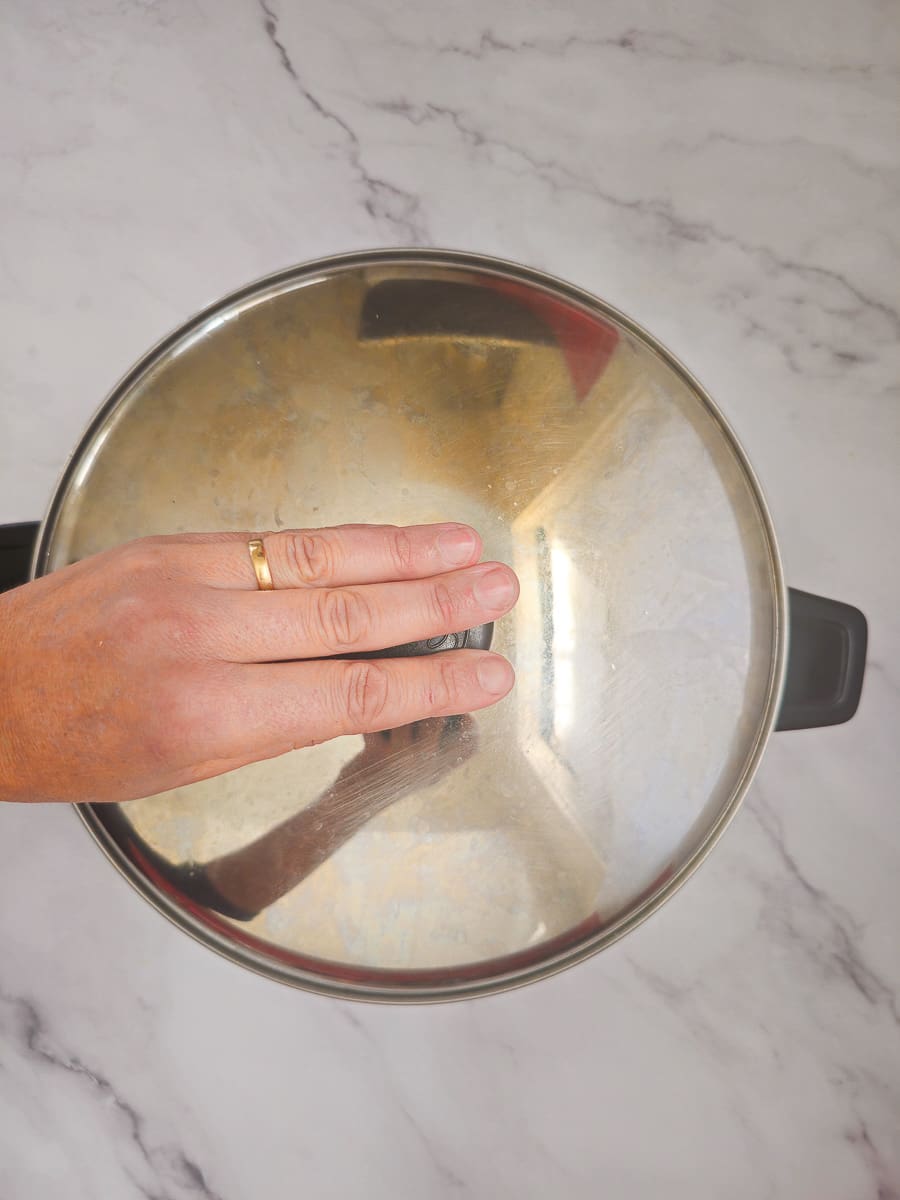
1. Fill a large pot, 2/3 of the way, with water and bring to a boil. Add 1 tablespoon salt to the water.
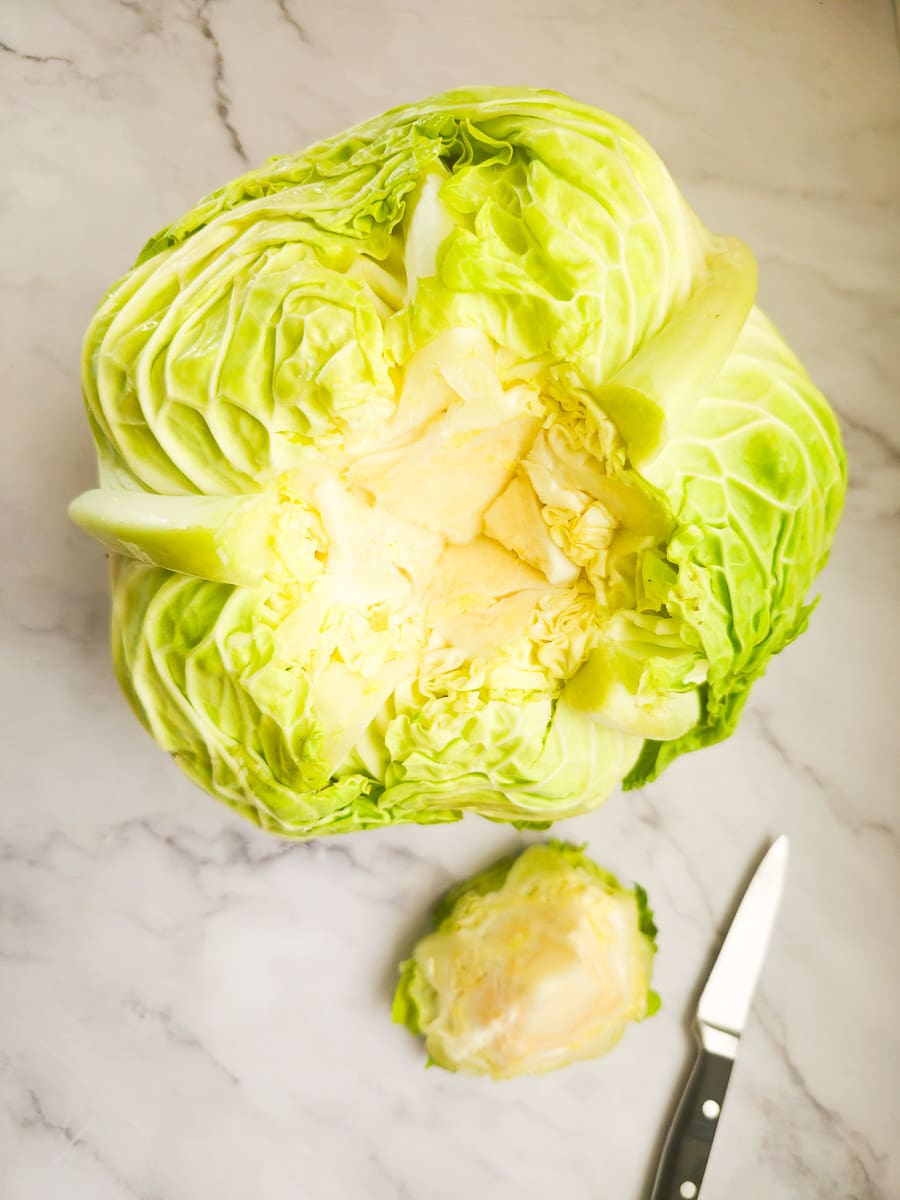
2. Carefully remove the core of the cabbage with a knife.
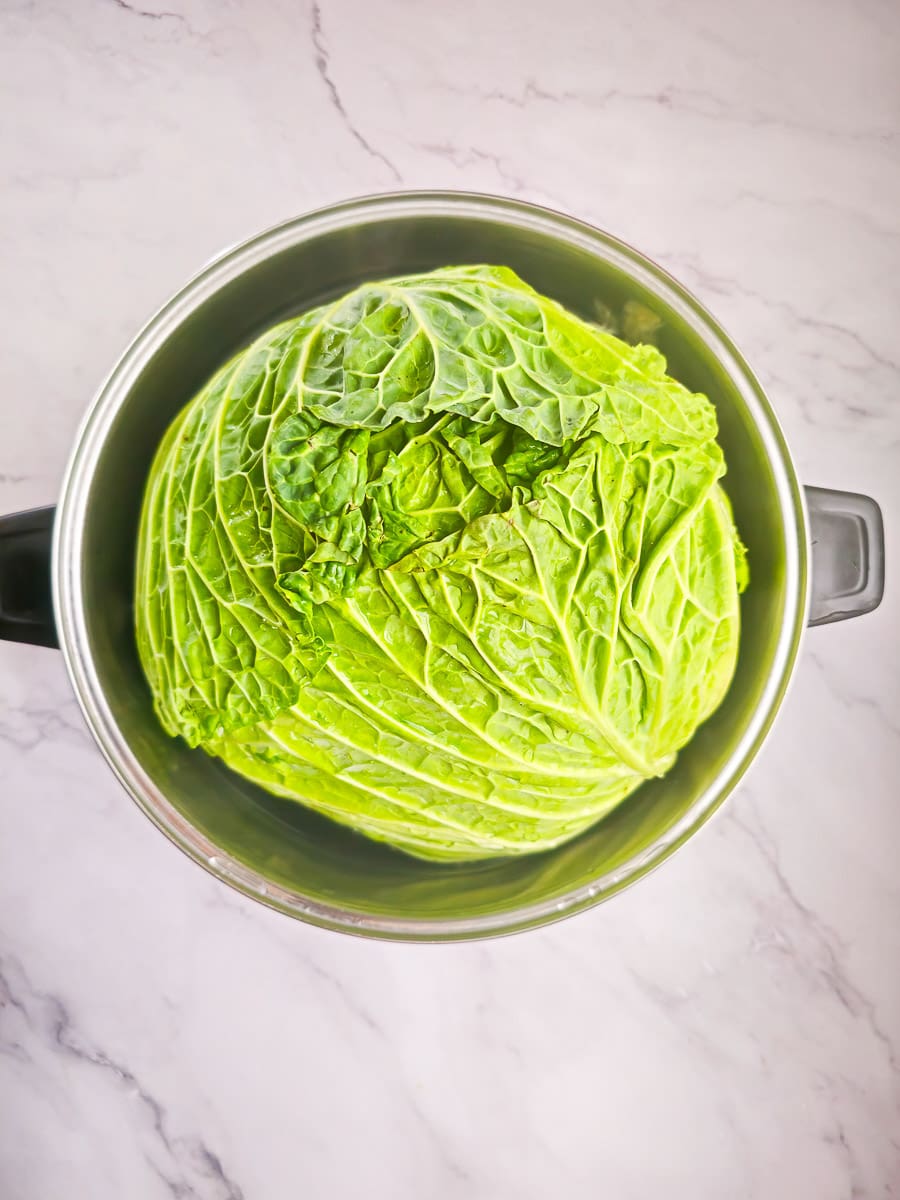
3. Place the cabbage, core side down, into the boiling water and simmer for approximately 15 minutes. Carefully turn the cabbage and simmer for another 1-2 minutes.
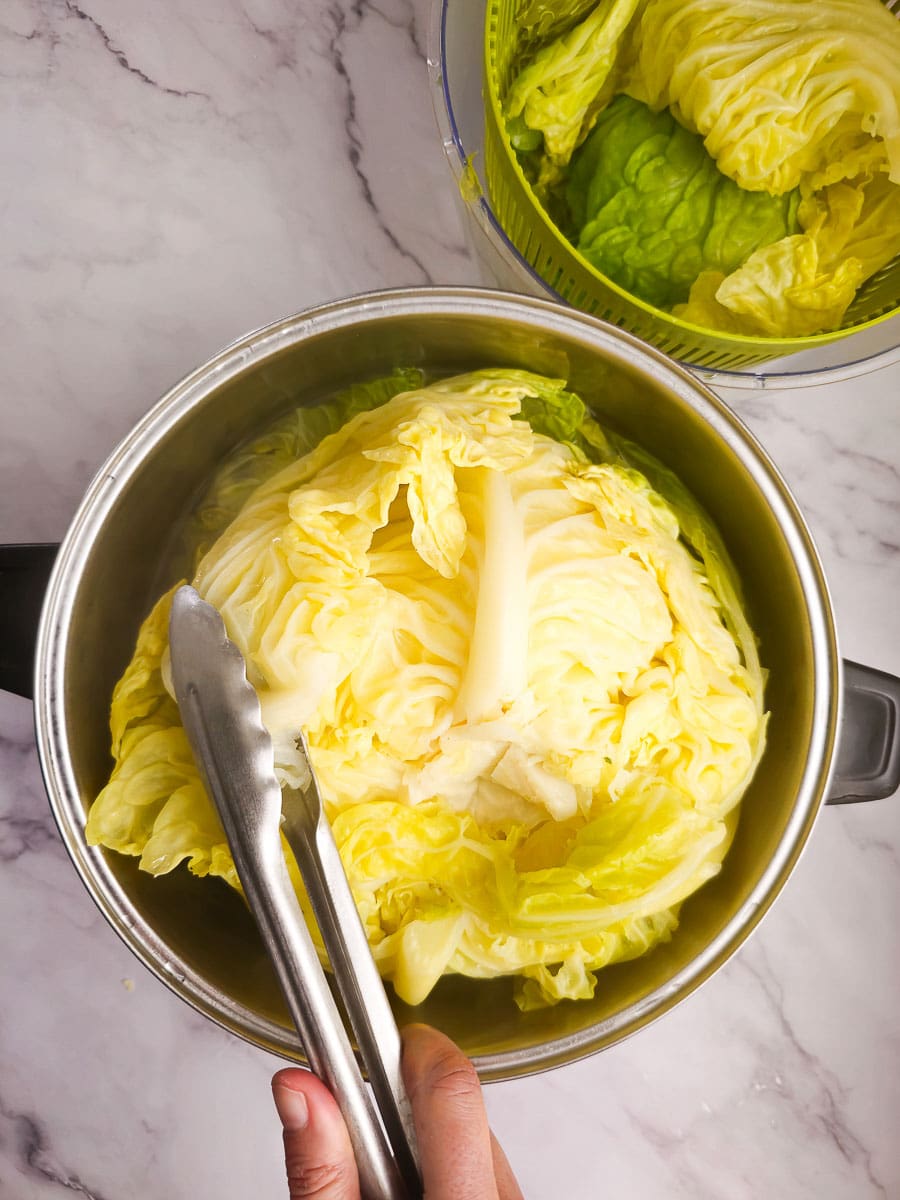
4. Turn off heat. Using tongs, gently remove outer leaves of cabbage. Place leaves in a colander to drain and cool.
Prepare the filling
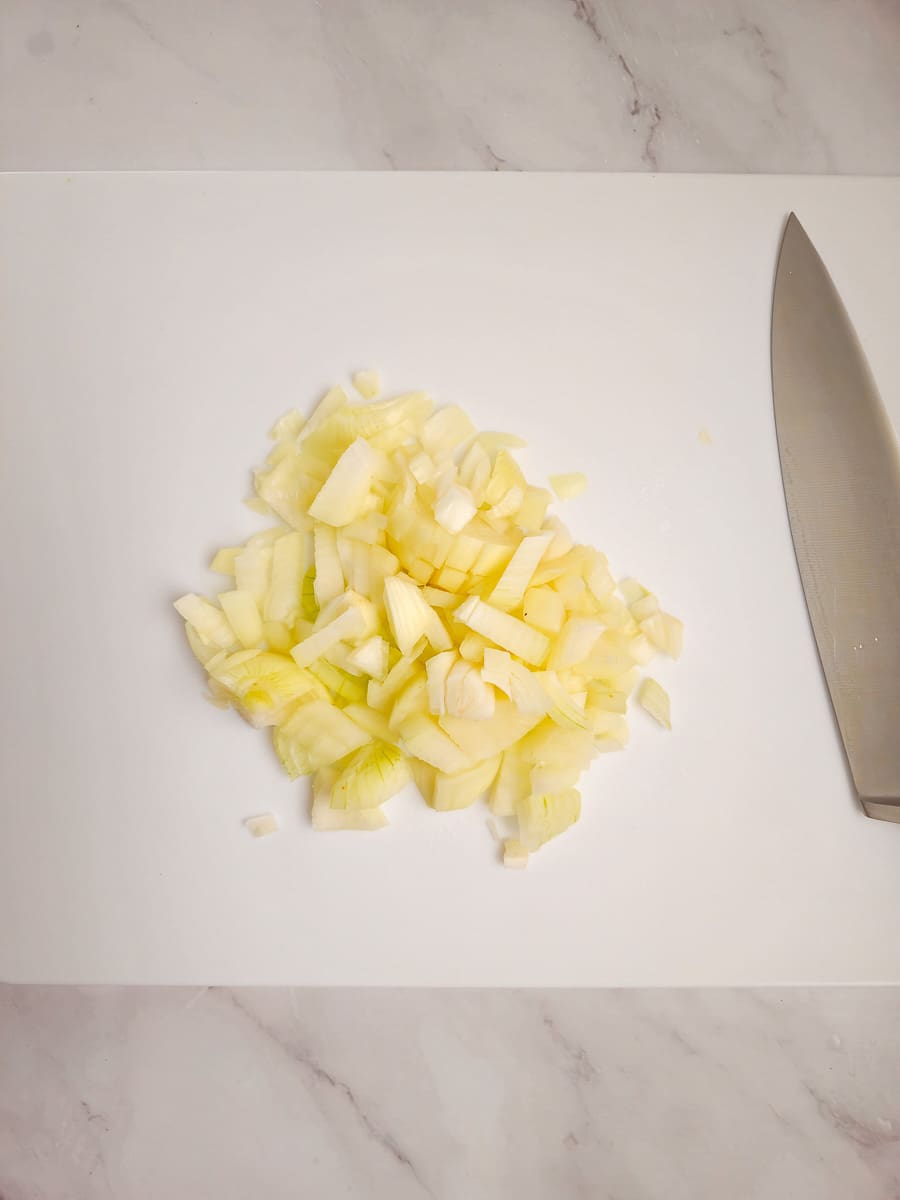
1. Dice the onion.
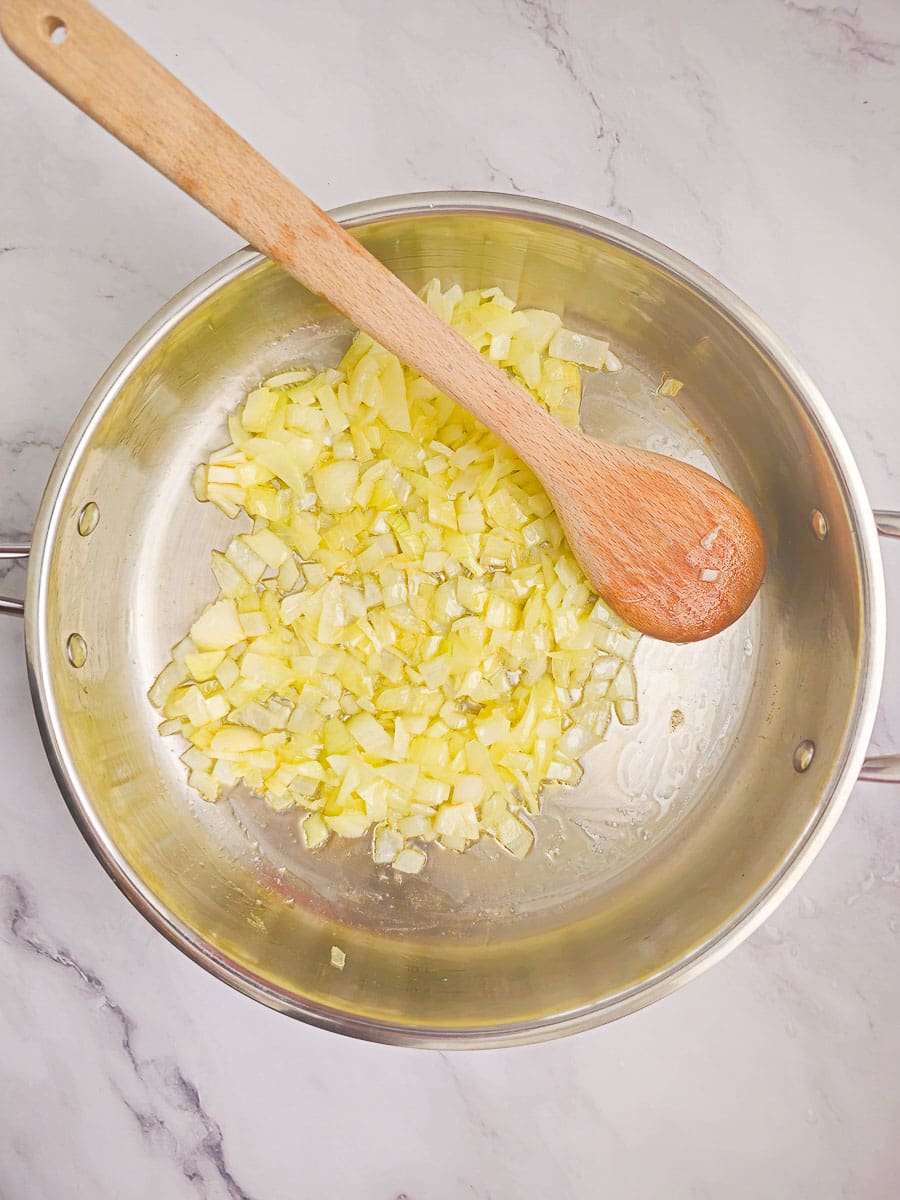
2. In a frying pan, heat 2 tablespoons of olive oil and add the onion. Sauté until soft.
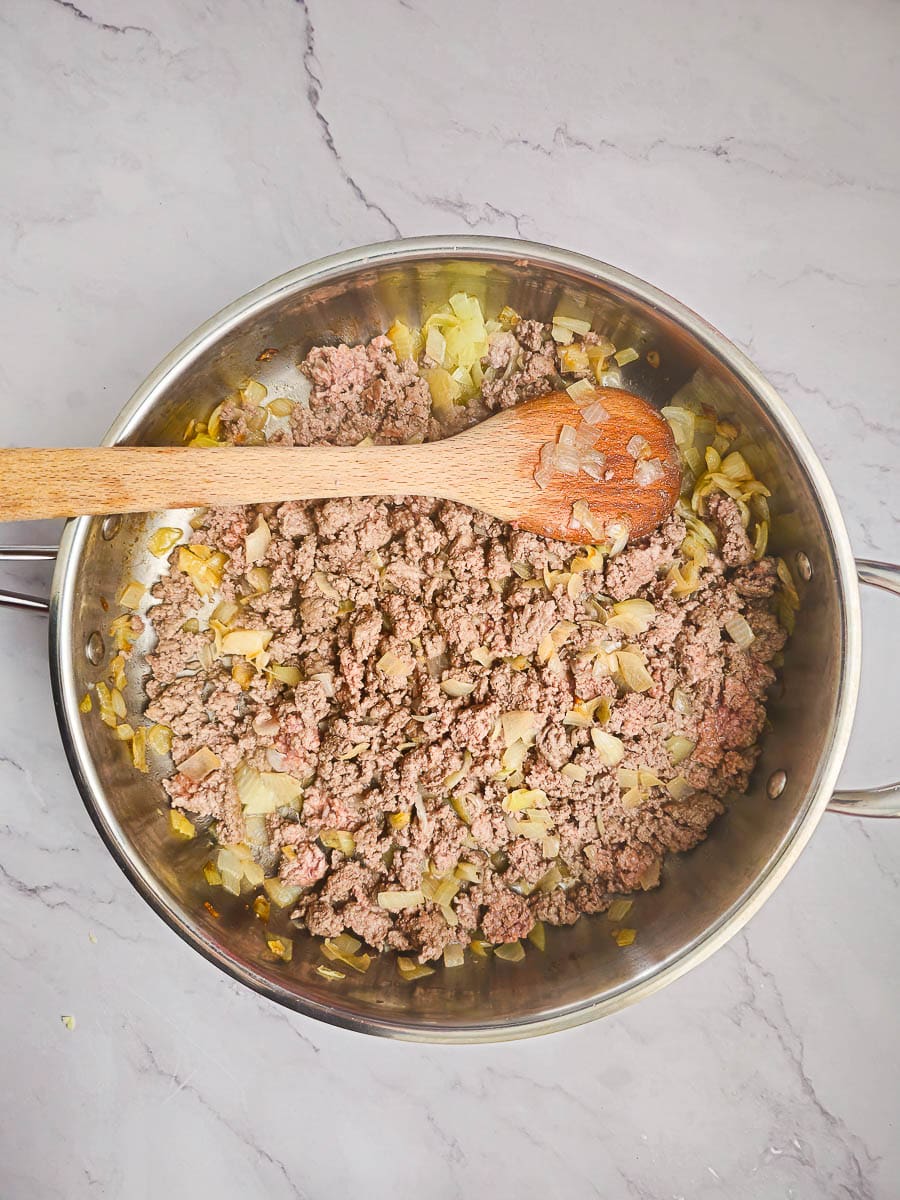
3. Add the minced / ground beef. Cook until just browned, breaking it up with a spoon as it cooks.
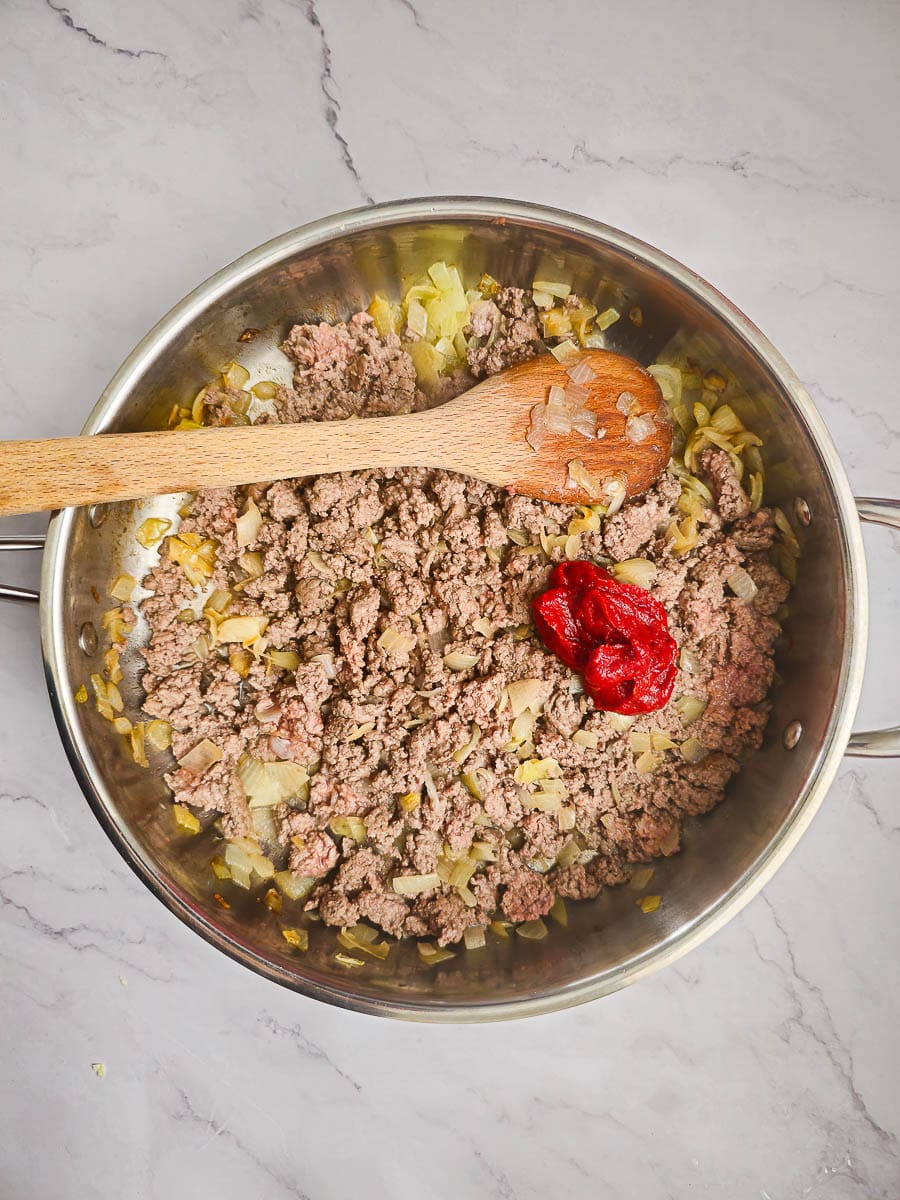
4. Add tomato paste and cook for 1 minute.
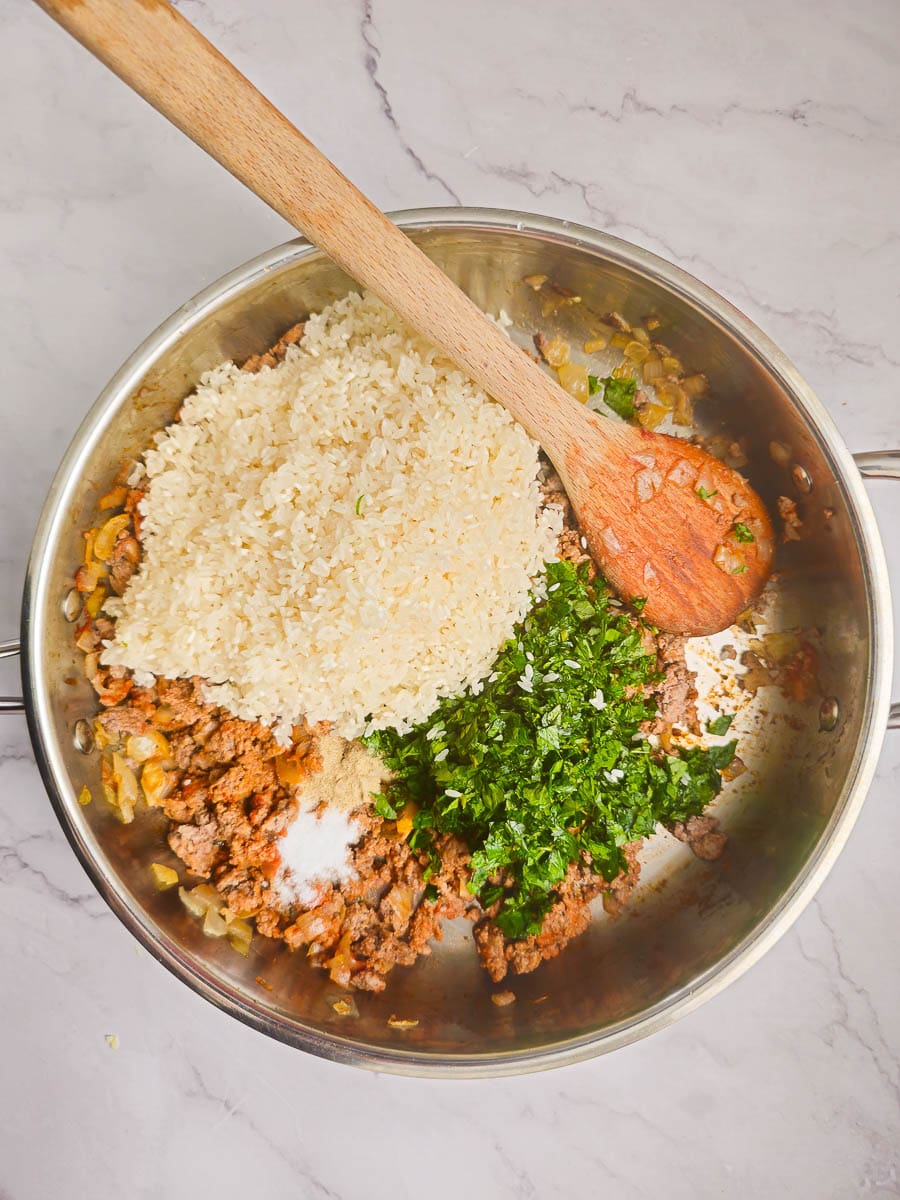
5. Add the rinsed rice, chopped parsley, chopped mint, salt, pepper and water.
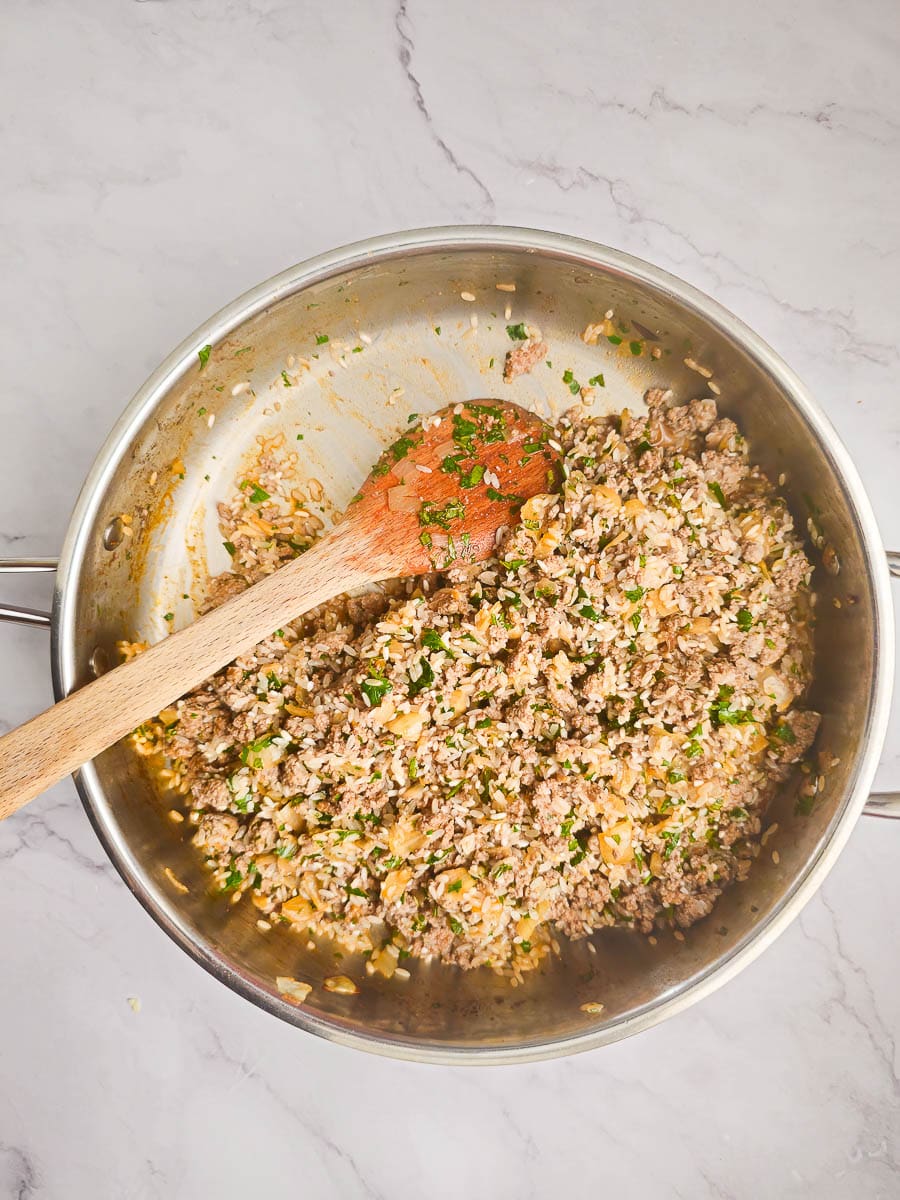
6. Stir through for 1-2 minutes or until the water has been absorbed. Set aside to cool slightly.
Assemble the cabbage rolls
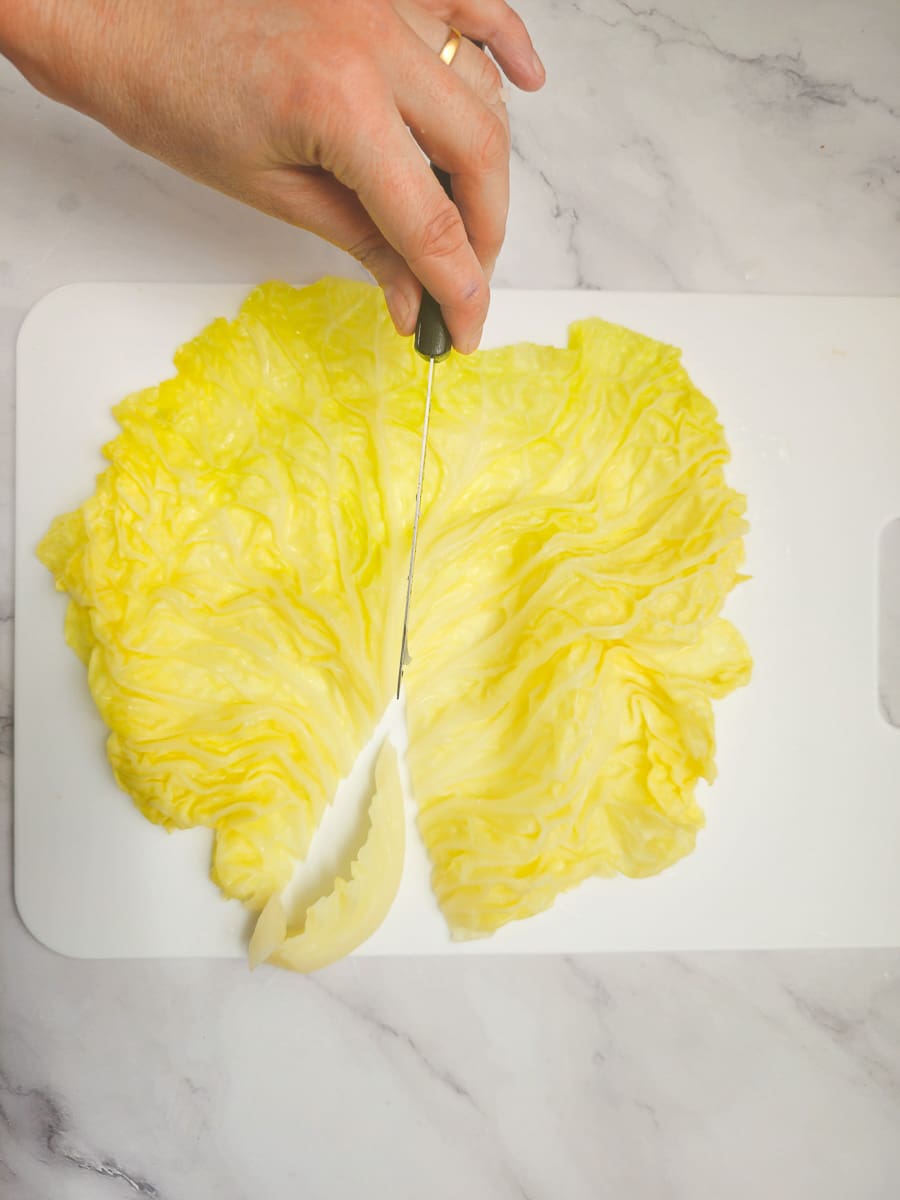
1. Cut a small ‘v’ from the core end of each leaf to remove the hard stem. Larger leaves can be cut in half.
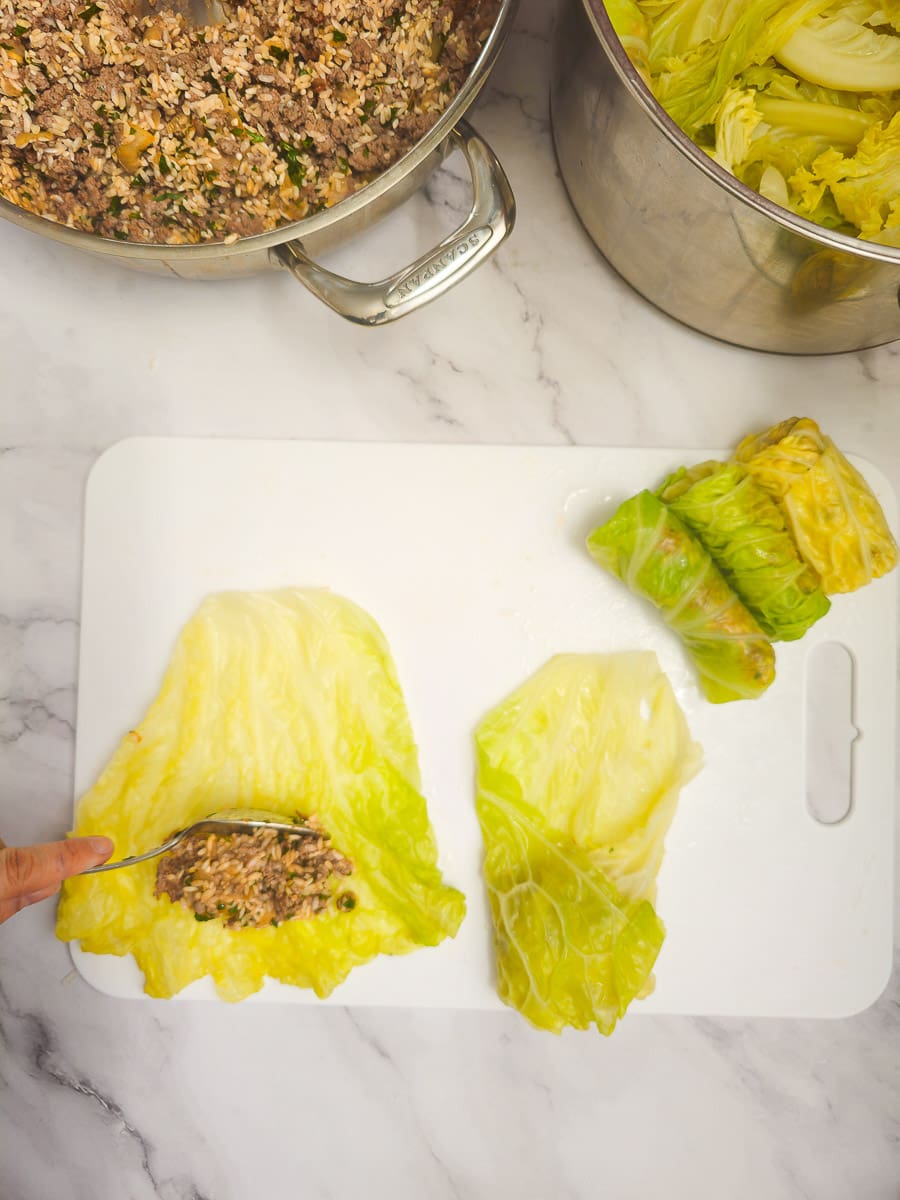
2. Place 1-2 tablespoons of the filling mixture onto the cabbage leaf. Gently roll the cabbage leaf, tucking in the sides as you roll. Repeat this step until you have used all the filling.
Cook the cabbage rolls
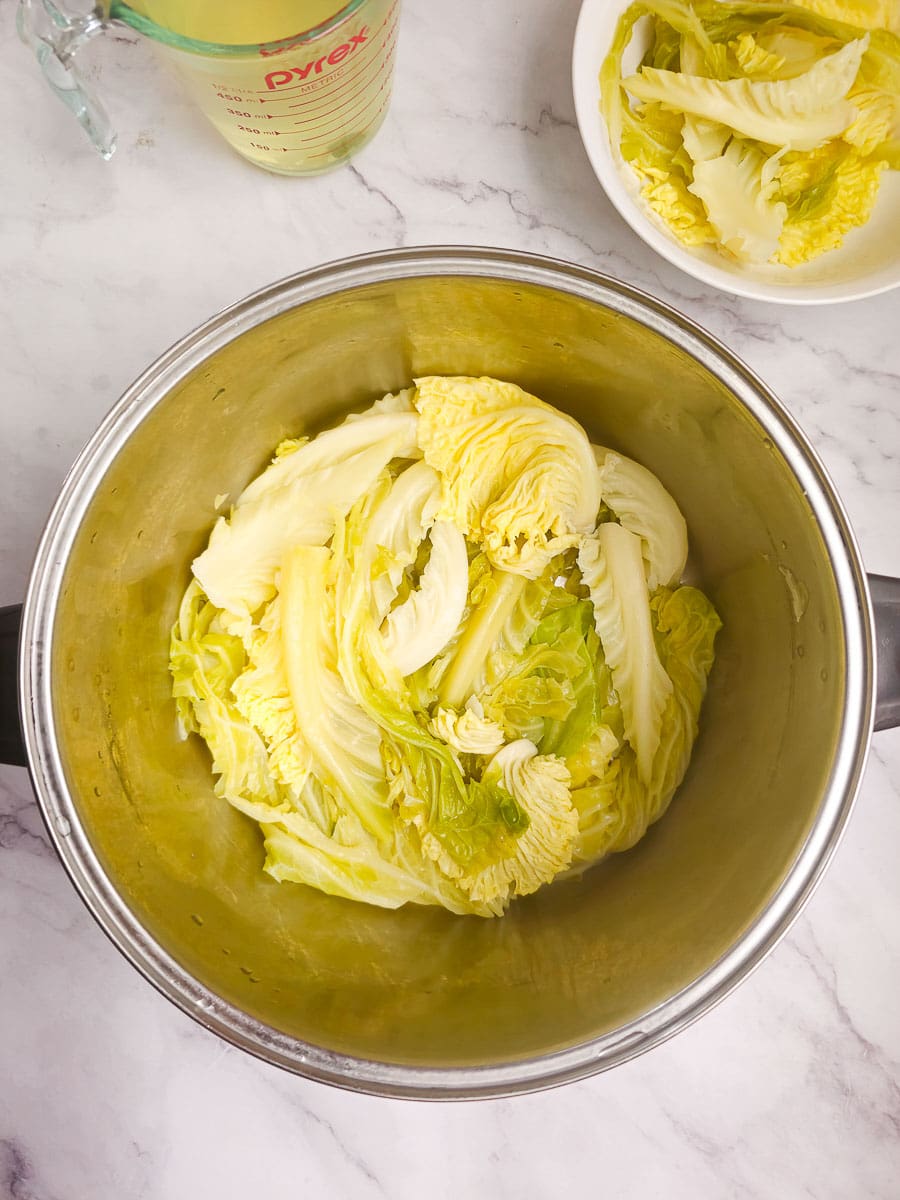
1. Layer the bottom of a large pot with the removed stems from the cabbage leaves, and any torn cabbage leaves or smaller cabbage leaves that were too small for rolling.
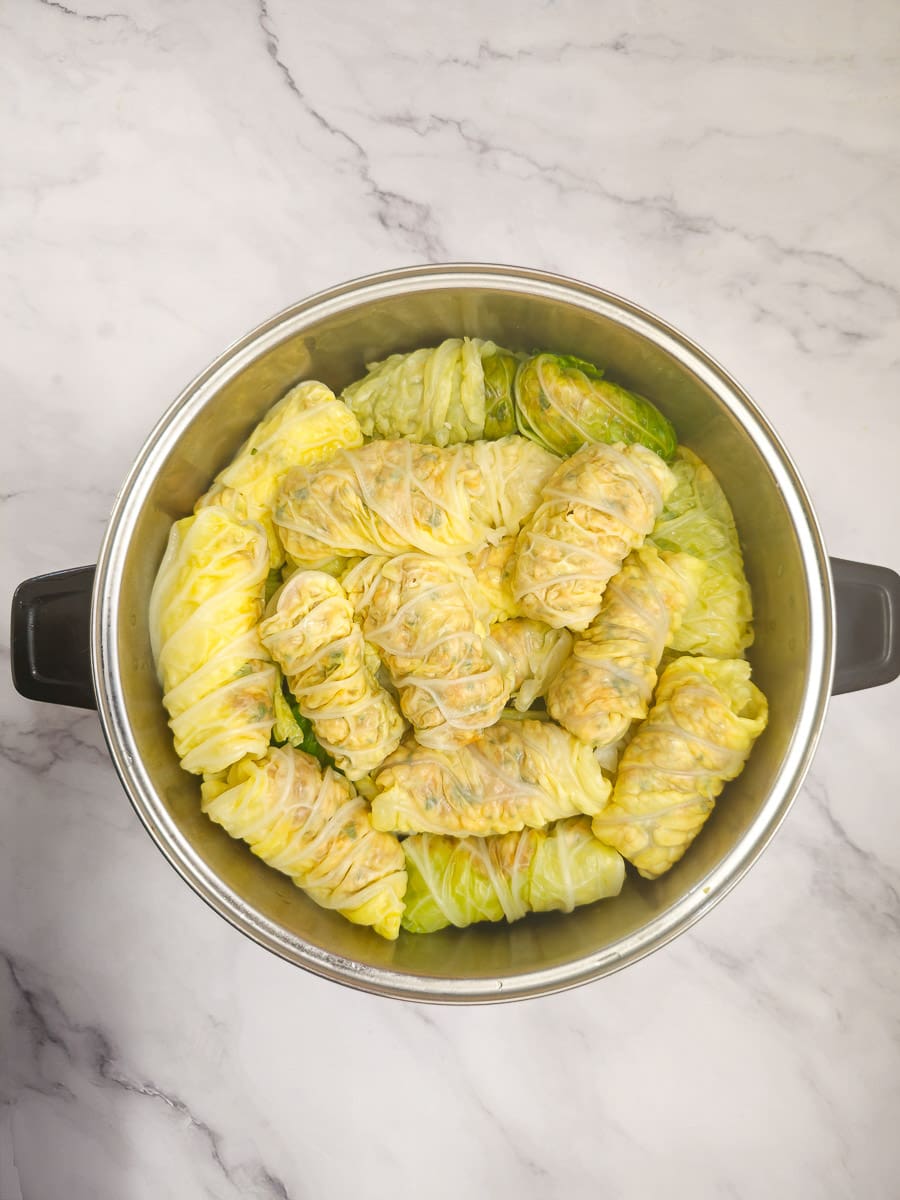
2. Arrange the cabbage rolls seam side down in the saucepan, packing them closely together.
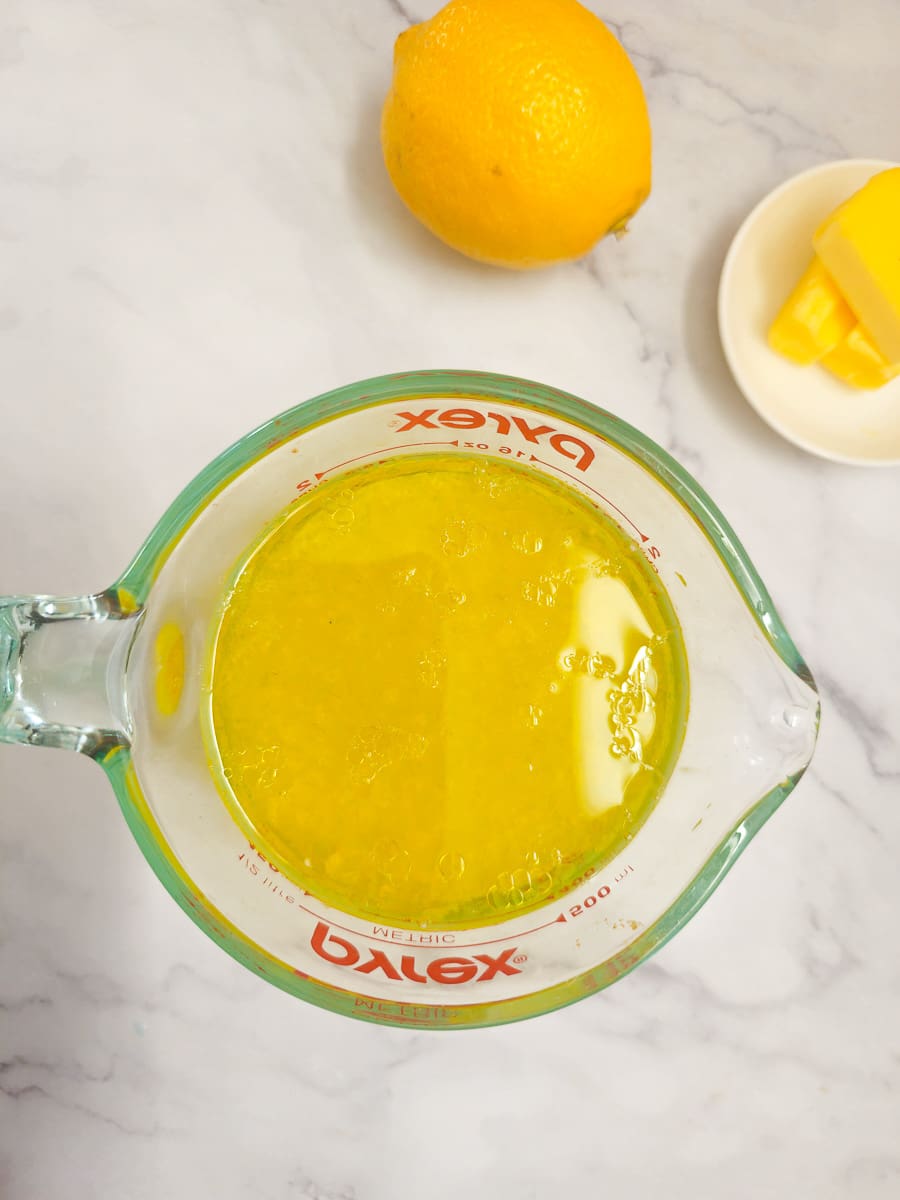
3. In a bowl or large measuring jug, prepare the cooking liquid. Combine 5 cups of hot water, olive oil, lemon juice, salt and pepper.
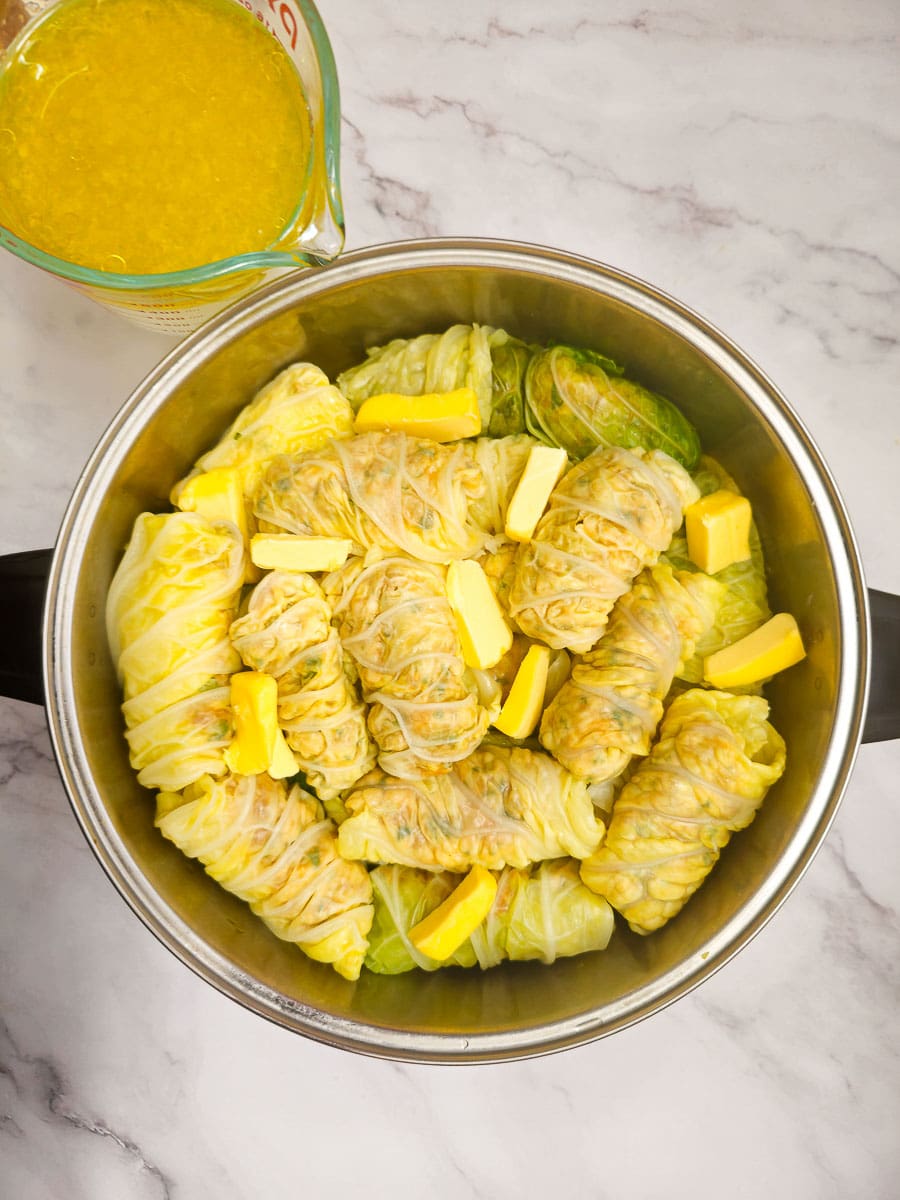
4. Pour cooking liquid over cabbage rolls. Place pieces of butter on top.
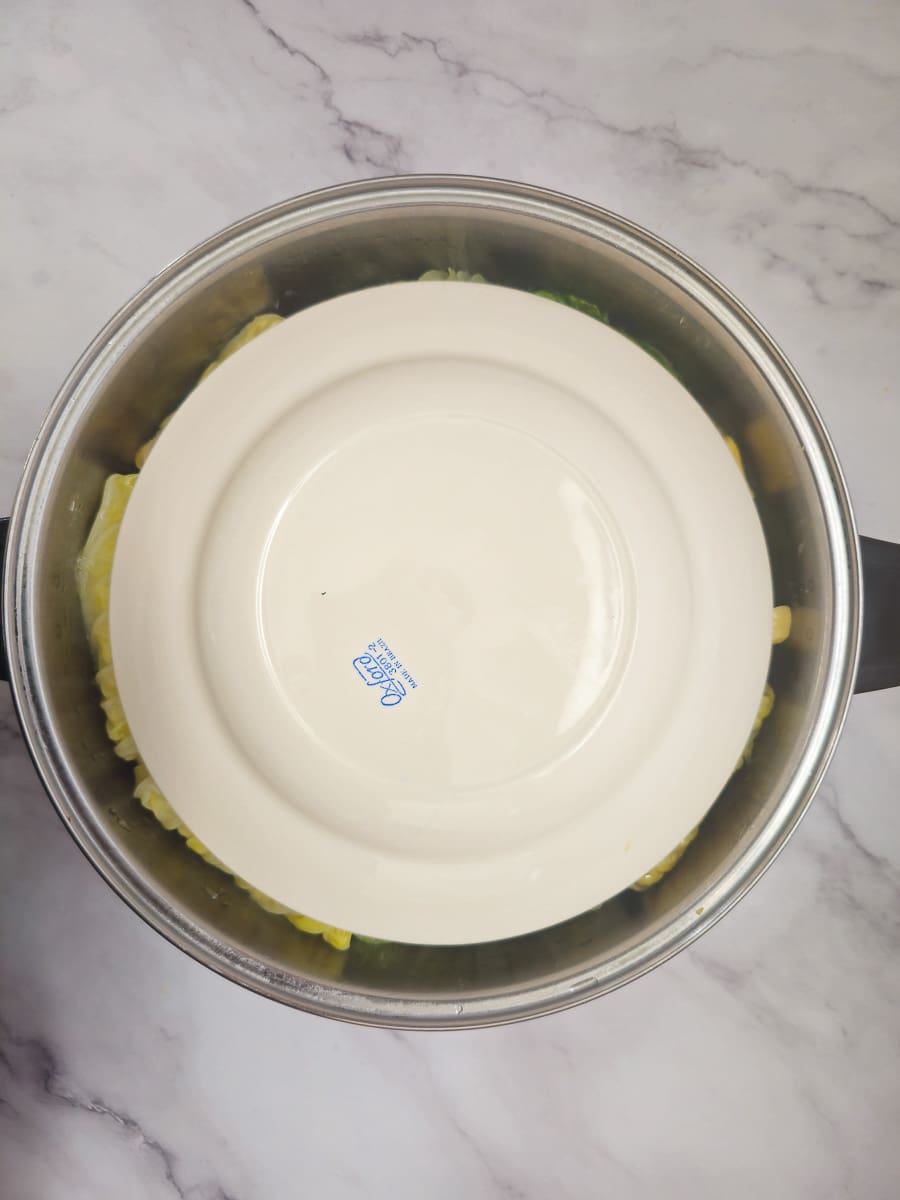
5. Place a large, inverted plate over the cabbage rolls to weigh them down and keep them submerged in the cooking liquid.
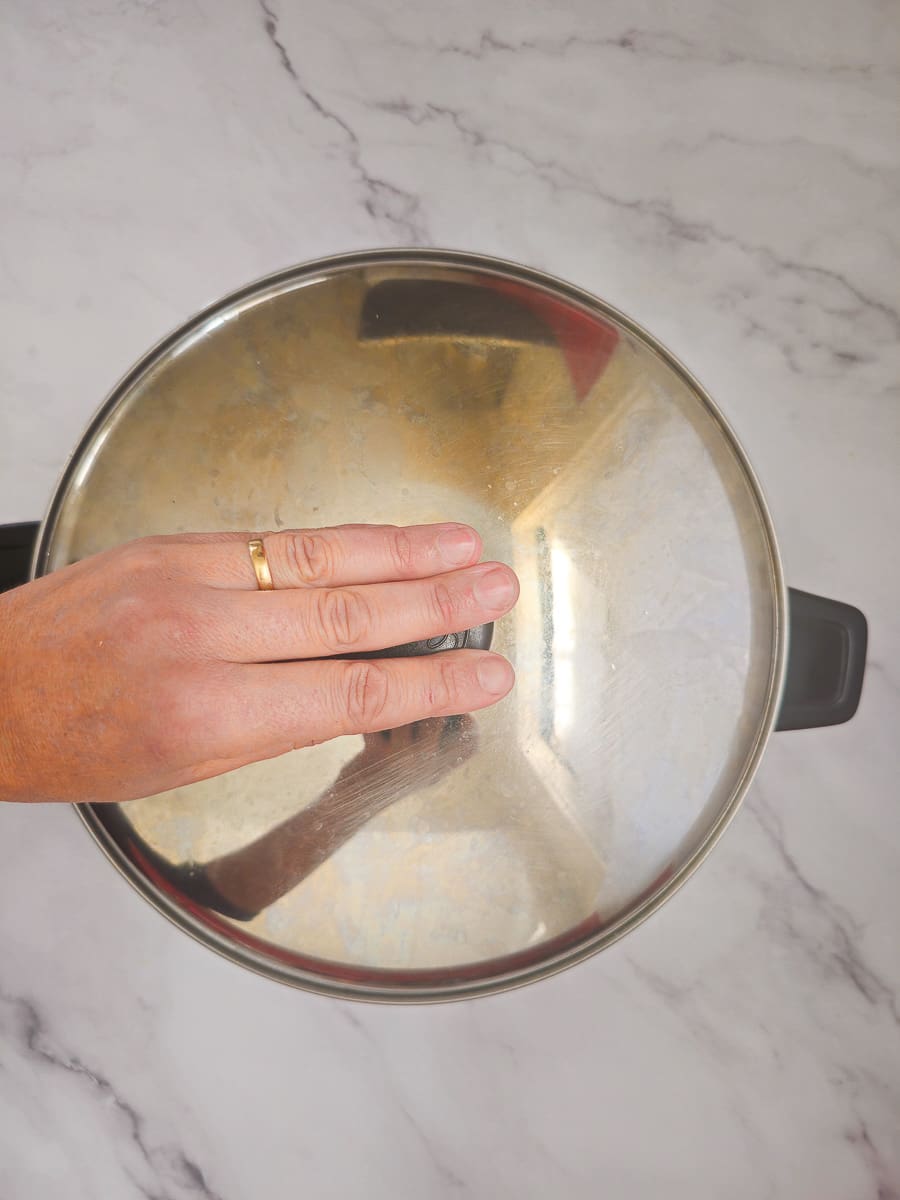
6. Bring to a boil then reduce heat to low and simmer, with lid on, for approximately 45-60 minutes, or until rice is cooked and cabbage is tender.
Prepare the lemon sauce
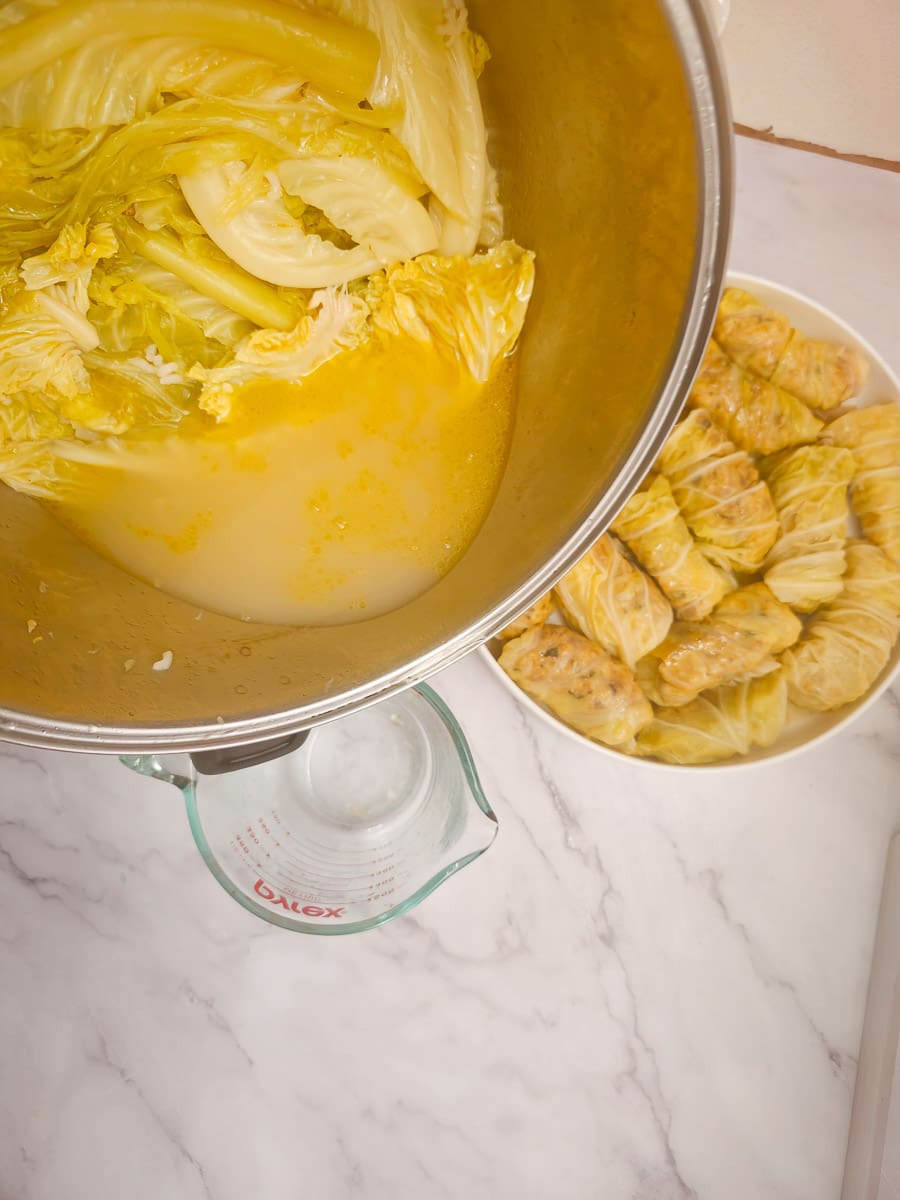
1. Carefully remove the cabbage rolls from the pot and set them aside. Measure approximately 1¾ cups of cooking liquid using a measuring jug.
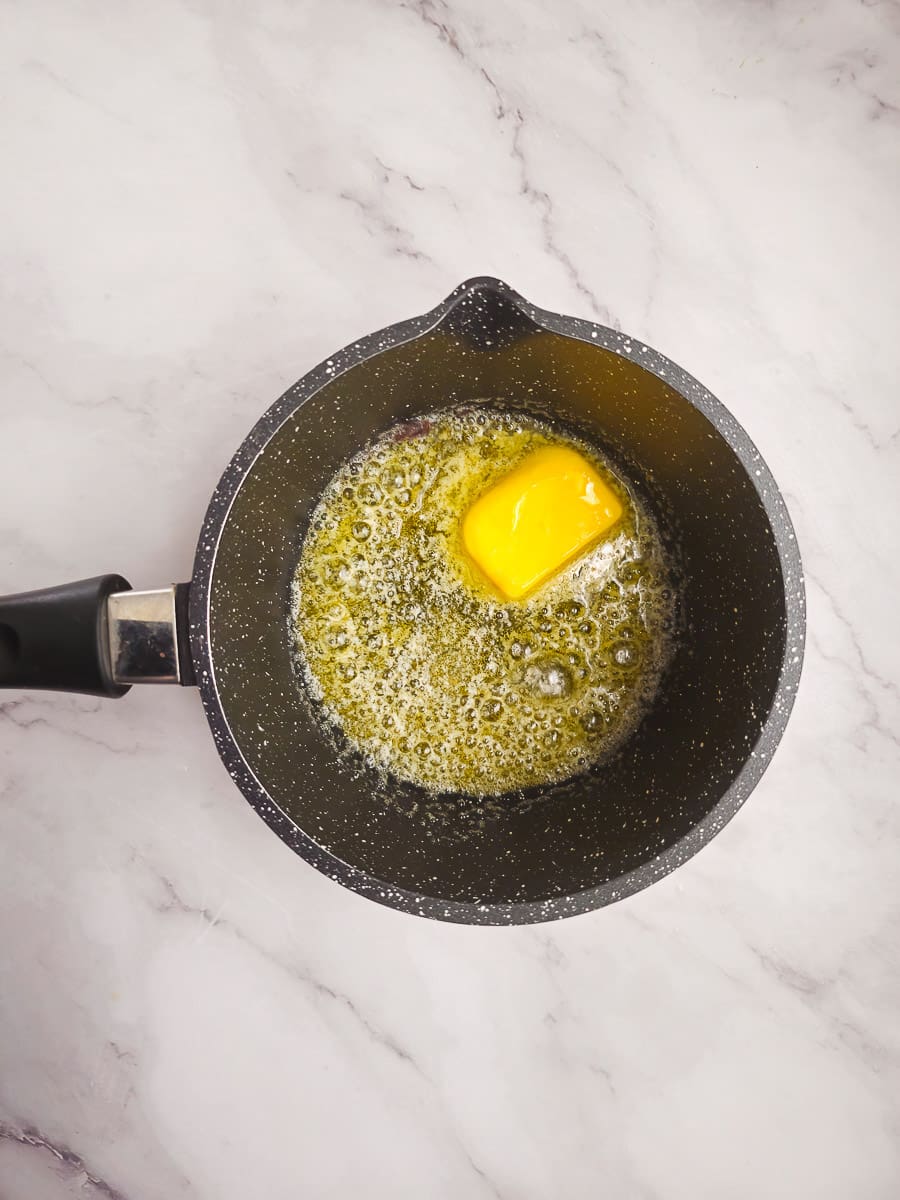
2. In a small saucepan, melt the butter over medium heat.
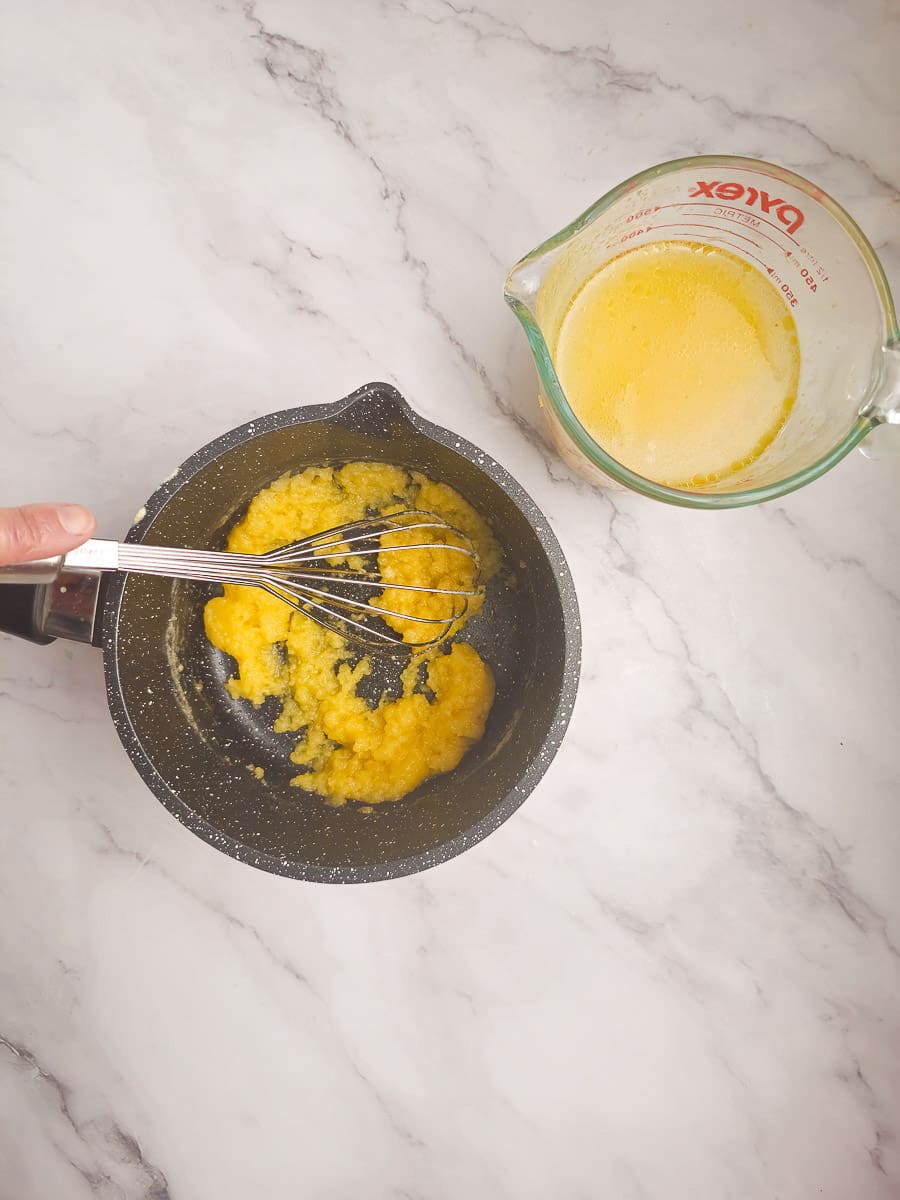
3. Add the plain flour and whisk to form a paste. Cook the paste for 1 minute, stirring constantly.
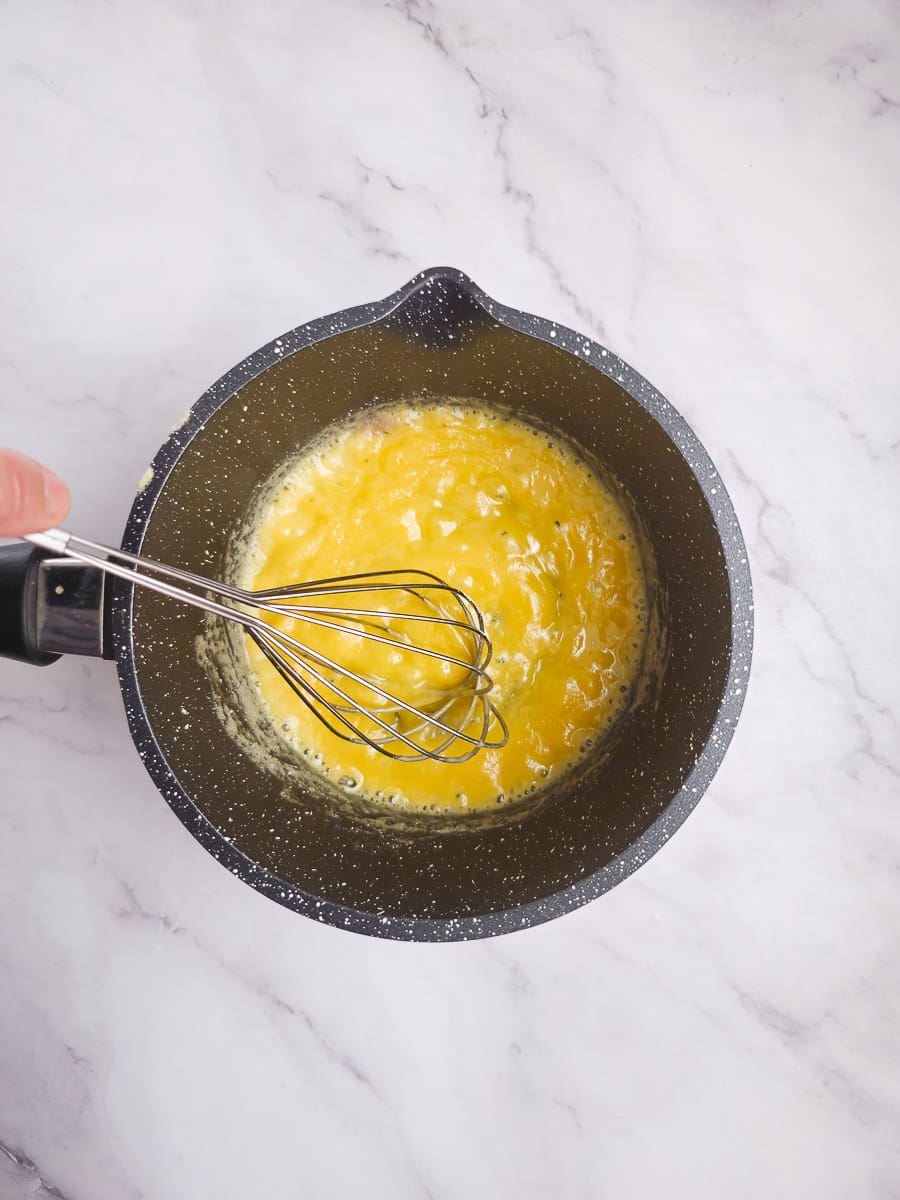
4. Gradually add the cooking liquid from the cooked cabbage rolls and 1 tablespoon of lemon juice to the saucepan and continue whisking for 6-8 minutes until the sauce thickens slightly but remains smooth and slightly runny.
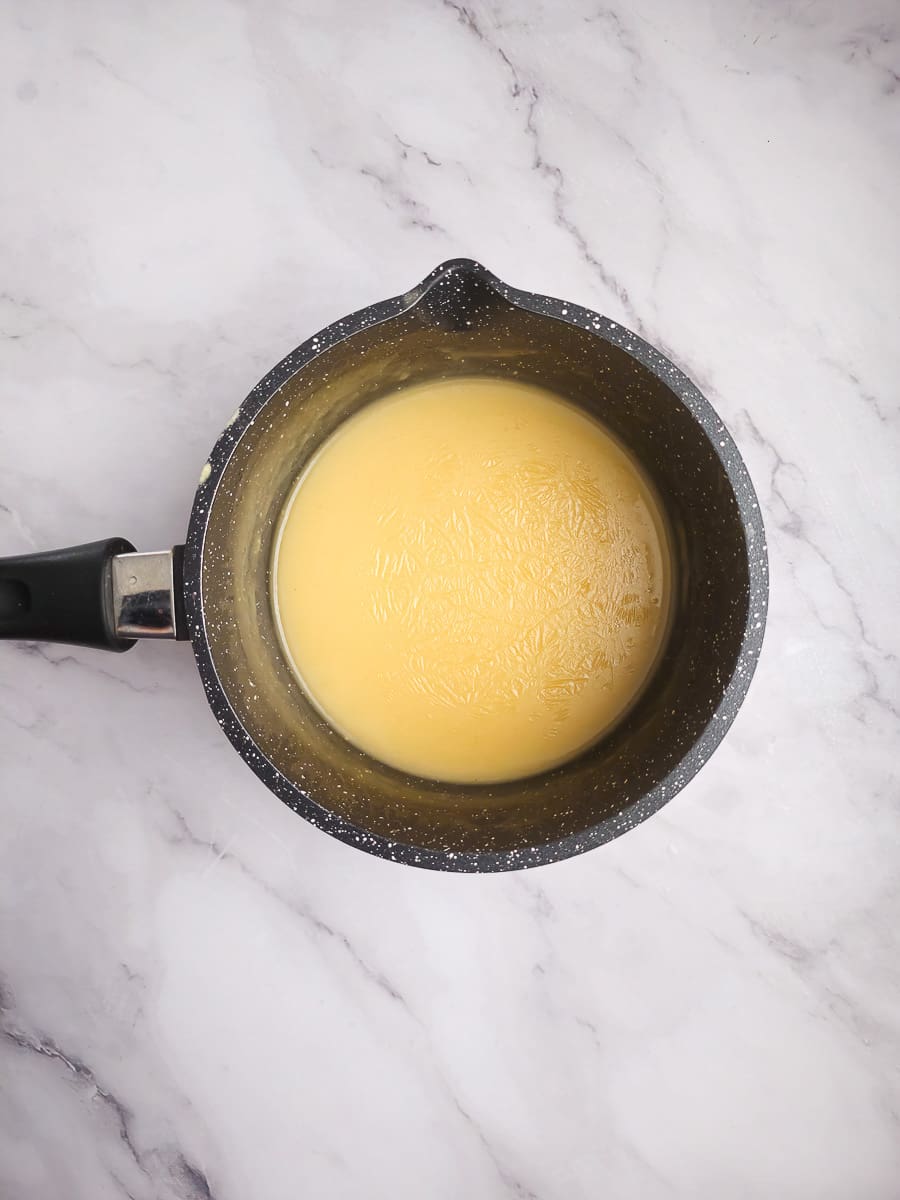
5. Taste the sauce and add the remaining lemon juice if desired.
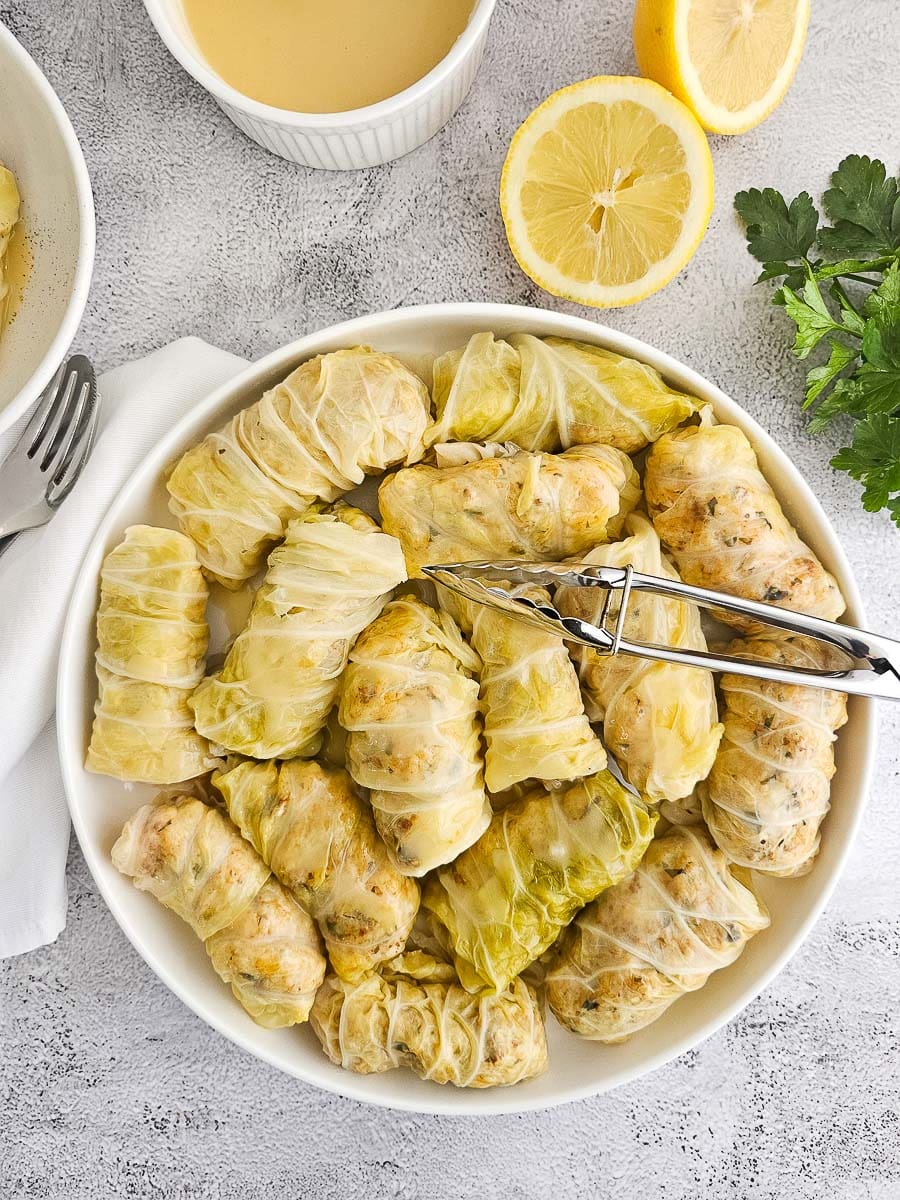
6. To serve, pour the sauce over the stuffed cabbage rolls. They also taste great with Greek yoghurt.
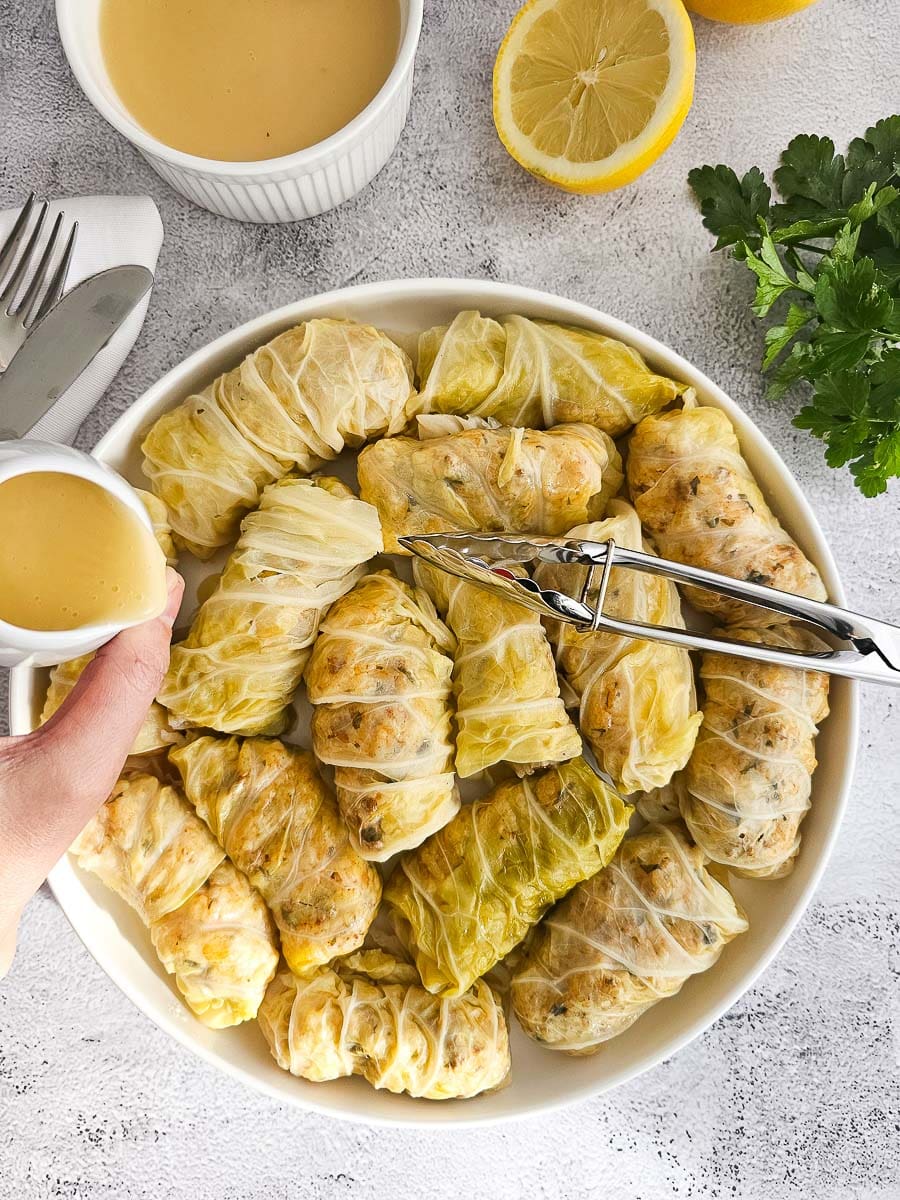
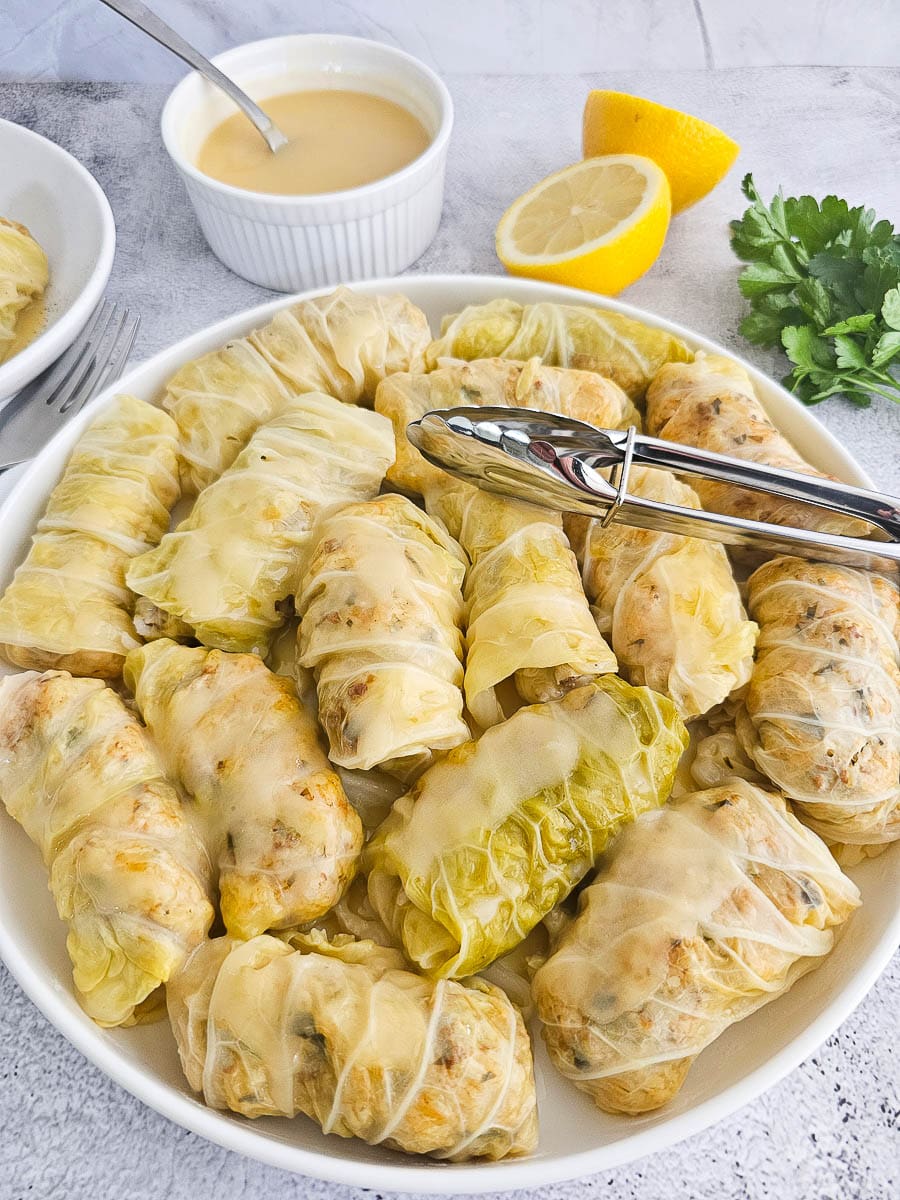
Health Benefits of Cabbage
Cabbage is packed with vitamins C and K and is an excellent source of fibre. Vitamin C supports a healthy immune system, aids in wound healing, and promotes collagen production for healthy skin. Vitamin K plays a crucial role in blood clotting and supports bone health. As a low-calorie vegetable, cabbage also aids in digestion and overall health. Additionally, cabbage contains antioxidants that may help reduce inflammation and promote heart health. Its high fibre content contributes to maintaining a healthy digestive system. For more information on the health benefits of cabbage, check out this article on Medical News Today: Health Benefits of Cabbage.
Tips for making Greek Stuffed Cabbage Rolls (Lahanodolmades) with Lemon Sauce
How to soften cabbage leaves for cabbage rolls
- Fill a large pot, 2/3 of the way, with water and bring to a boil. Add 1 tablespoon salt to the water.
- Using a sharp knife, carefully remove the core of the cabbage. This will help the leaves separate more easily.
- Carefully place the whole cabbage, core side down, into the boiling water.
- Let the cabbage simmer for about 15 minutes.
- Carefully turn the cabbage and simmer for another 1-2 minutes.
- As the leaves start to soften, they will begin to peel away from the head.
- Turn off the heat. Using tongs, gently pull off the leaves one by one as they soften.
- Place the softened leaves in a colander to drain and cool. You can also rinse them under cold water to stop the cooking process and make them easier to handle.
- If it becomes difficult to remove leaves, turn over cabbage (core side down) and simmer for another 2-3 minutes or until leaves soften and are easy to remove.
Line the base with cabbage leaves
Line the bottom of your pot with cabbage leaves to prevent the rolls from catching at the bottom. Use a couple of the larger outer leaves of the cabbage and any broken or small leaves that aren’t suitable for rolling. If you don’t have enough cabbage leaves, you can line the base with a layer of sliced potatoes or a few extra layers of the remaining cabbage core, which will also help absorb excess liquid and add flavour.
What to do with extra cabbage leaves
When making Greek Stuffed Cabbage Rolls, don’t let the leftover cabbage leaves go to waste! After lining the base of your pot with some of the extra cabbage leaves, save the rest to place on top of your cabbage rolls while they cook. They also absorb the flavours of the dish, turning out really tasty. You can enjoy these softened, flavourful cabbage leaves alongside the Lahanodolmades.
Secure the rolls with a plate
To make sure the cabbage rolls are cooked evenly and don’t unravel whilst cooking, place a heatproof plate on top of them before putting the lid on the pot. This method helps to keep the rolls submerged and ensures uniform cooking.
Variations
You can add a chicken stock cube to the cooking liquid for extra flavour. You could also place some of the filling in some vine leaves and add them to the pot along with the cabbage rolls.
Serve with Lemon Sauce
This lemon sauce is a must! It’s made in a similar way to bechamel sauce but uses the cooking liquid from the cabbage rolls instead of milk. It has a rich lemon flavour that tastes so good with the Greek Stuffed Cabbage Rolls. If you prefer to add an avgolemono sauce, you can follow the steps in my Greek Lemon Chicken Soup (Avgolemono) recipe and substitute the chicken broth with the cabbage roll liquid instead.
You could also accompany your Greek Stuffed Cabbage Rolls with some Greek yoghurt or Tzatziki (Greek Yoghurt Dip) on the side.
Can I prepare this recipe ahead of time?
Definitely! This recipe does take a bit of time to prepare. You can prepare the filling ahead of time and cook the cabbage, then cool slightly and store both in the fridge. Alternatively, you could even roll the cabbage rolls and store them in the fridge until you’re ready to cook them.
Storage
Leftovers can be stored in the refrigerator for up to 3 days or frozen for up to 3 months. To reheat, thaw overnight in the fridge and warm in the microwave until heated through.



Cabbage rolls were delicious…..easier than i thought to make. Loved the lemon sauce!!!
I’m so glad you enjoyed the cabbage rolls! The lemon sauce is one of my favourite parts too—it really brings the dish together. Thank you for taking the time to share your feedback!